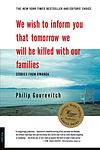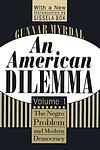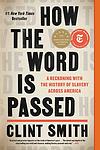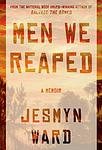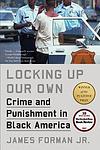The Greatest "Nonfiction, Racism" Books of All Time
Click to learn how this list is calculated.
This list represents a comprehensive and trusted collection of the greatest books. Developed through a specialized algorithm, it brings together 300 'best of' book lists to form a definitive guide to the world's most acclaimed books. For those interested in how these books are chosen, additional details can be found on the rankings page.
Genres
The category of "Racism" in books refers to literature that explores the complex and often painful experiences of individuals and communities who have been subjected to discrimination, prejudice, and bigotry based on their race or ethnicity. These books may examine the historical roots of racism, its impact on society, and the ways in which individuals and communities have resisted and overcome it. They may also offer insights into the psychological and emotional toll of racism, as well as the ways in which it intersects with other forms of oppression such as sexism, homophobia, and classism. Overall, books in this category seek to raise awareness of the ongoing struggle against racism and to promote greater understanding and empathy among readers.
Countries
Date Range
Reading Statistics
Click the button below to see how many of these books you've read!
Download
If you're interested in downloading this list as a CSV file for use in a spreadsheet application, you can easily do so by clicking the button below. Please note that to ensure a manageable file size and faster download, the CSV will include details for only the first 500 books.
Download-
1. The Souls of Black Folk by W. E. B. Du Bois
This seminal work is a collection of essays that explores the history and condition of African Americans at the turn of the 20th century. It delves into the issues of race, class, and the socio-economic realities faced by black people post-emancipation. The author employs a combination of history, sociology, and personal narrative to present a powerful critique of American society, highlighting the struggle for civil rights, the importance of black spirituals, and the concept of "double consciousness" - the idea of viewing oneself through the lens of a society that sees you as inferior.
-
2. Incidents in the Life of a Slave Girl by Harriet Jacobs
This book is a poignant autobiography that depicts the life of a young woman born into slavery in the southern United States in the early 19th century. The narrative provides a harrowing account of her childhood and adolescence, marked by abuse and exploitation. In her desperate quest for freedom, she spends seven years in a tiny attic, hiding from her oppressive master. The narrative serves as a powerful critique of the brutalities of slavery, and a testament to the author's indomitable spirit and pursuit of freedom.
-
3. The Fire Next Time by James Baldwin
This book is a powerful exploration of race relations in America in the early 1960s. The author presents his experiences and observations in the form of two essays. The first is a letter to his 14-year-old nephew, discussing the role of race in American history. The second essay takes a broader look at the civil rights movement and the author's own experiences with religion and identity. Throughout, the author presents a passionate plea for the recognition of the humanity and dignity of all people, regardless of race.
-
4. The Color of Water: A Black Man's Tribute to His White Mother by James McBride
This book is a moving memoir that tells the story of a biracial man raised in a housing project in Brooklyn by his white, Jewish mother. The narrative alternates between the author's perspective and his mother's, providing a nuanced view of issues related to race, religion, and identity. The author's mother, a Polish immigrant, married a black man in the 1940s and raised twelve children in the midst of poverty and racial tension. Despite the hardships, she instilled in her children the importance of education and self-reliance. The book is a tribute to the strength, resilience, and love of this remarkable woman.
-
5. We Wish to Inform You That Tomorrow We Will Be Killed With Our Families: Stories from Rwanda by Philip Gourevitch
This book is a chilling account of the Rwandan genocide that took place in 1994, where an estimated 800,000 to 1 million Tutsis and moderate Hutus were systematically murdered within a span of 100 days. The author provides a detailed narrative based on interviews with survivors and perpetrators, shedding light on the horrifying events, the international community's failure to intervene, and the aftermath of the genocide. The book serves as a powerful critique of political indifference and a poignant exploration of the depths of human brutality.
-
6. An American Dilemma by Gunnar Myrdal
This book is a comprehensive sociological study on the issues faced by African Americans in the United States during the mid-twentieth century. The author examines the deep-rooted racial discrimination and inequality prevalent in American society, exploring its origins, implications, and potential solutions. The work is notable for its detailed analysis and its impact on subsequent civil rights movements.
-
7. Roll, Jordan, Roll by Eugene Genovese
"Roll, Jordan, Roll" is a comprehensive exploration of slavery in the United States, specifically focusing on the complex relationships between slaves and their masters. The book examines how slaves managed to preserve their culture, humanity and dignity, while also highlighting the paradoxical nature of a system where slave owners were dependent on their slaves for their livelihoods. It delves into the ways in which slaves resisted their oppression, and the strategies they employed to survive and create their own communities within the confines of the brutal institution of slavery.
-
8. Dreams from My Father by Barack Obama
This memoir explores the life of a man who grew up in a multicultural family, with a Kenyan father and an American mother. The narrative delves into his early years in Hawaii and Indonesia, his self-discovery and racial awakening in Chicago, and his journey to Kenya to learn more about his father's heritage. The book provides an introspective look at the author's struggle with his racial identity, his relationship with his family, and his path to finding his place in the world.
-
9. Between the World and Me by Ta-Nehisi Coates
The book is a profound work that explores the concept of race in America through the lens of the author's personal experiences. It is written as a letter to the author's teenage son, offering him a stark portrayal of his place in a society that is marked by racial injustice. The narrative provides a deeply personal analysis of American history and its lasting impact on the African American community, with the author sharing his experiences of fear, violence, and struggle. It is an exploration of the physical and psychological impacts of being black in the United States, and a call for a deeper understanding of the nation's racial history.
-
10. The Strange Career of Jim Crow by C. Vann Woodward
This historical analysis examines the history and development of racial segregation laws, known as "Jim Crow", in the United States. It explores the origins of these laws in the post-Civil War era, their enforcement in the South, and the eventual resistance and dismantling of them during the Civil Rights Movement. The book also challenges the perception that segregation was a natural outcome of racial tensions, instead arguing that it was a system carefully constructed by white elites to maintain economic and political control.
-
11. Common Ground by J. Anthony Lukas
"Common Ground" is a non-fiction book that provides an in-depth examination of racial tensions in Boston, Massachusetts during the 1960s and 1970s, primarily focusing on the controversial issue of court-ordered busing to integrate public schools. The narrative follows three families - one African-American, one Irish-American, and one Yankee - to depict the effects of these tensions on the city's different communities. The book also explores the historical, political, and social context of these events, offering a comprehensive analysis of a critical period in American history.
-
12. Praying for Sheetrock by Melissa Fay Greene
"Praying for Sheetrock" is a non-fiction narrative that tells the story of racial tension and civil rights struggles in a small coastal town in Georgia during the 1970s. It focuses on the experiences of the African American community who, led by a charismatic shrimp boat worker, stand up against the corruption and racial discrimination perpetrated by the town's white sheriff and his deputies. The book provides an intimate portrayal of the town's residents, their hardships, and their fight for justice and equality.
-
13. War Without Mercy by John W. Dower
This book provides a detailed analysis of the racial aspects that influenced the Pacific War during World War II. It explores the racial stereotypes, propaganda, and policies that were used by both the United States and Japan, and how these factors contributed to the extreme violence and hatred that characterized the conflict. The book also examines the impact of these racial attitudes on the post-war relations between the two countries.
-
14. Dear Theo: The Autobiography of Vincent Van Gogh by Irving Stone, Jean Stone
The book is a compilation of letters from the renowned Dutch painter to his brother Theo, offering an intimate glimpse into the artist's life, thoughts, and struggles. Through these personal correspondences, readers gain insight into the painter's evolving artistic vision, his financial hardships, and his battle with mental illness. The letters also reveal the deep bond between the brothers, with Theo providing unwavering emotional and financial support. This collection not only sheds light on the painter's complex inner world but also provides a unique perspective on his journey to becoming one of the most influential figures in the history of Western art.
-
15. Race Matters by Cornel West
This book is a profound exploration of the impact of race and racism on modern America. It examines the crisis of African-American leadership, the pitfalls of black conservatism, the myth of 'gangsta' culture, and the temptations of black nationalism. The author also delves into the complexities of affirmative action and the damaging effects of the nihilistic threat to the black community. The work offers a critical analysis of the current state of race relations in the United States and proposes solutions for creating a more equitable society.
-
16. Arab and Jew by David K. Shipler
The book explores the cultural, political, and personal divisions between Arabs and Jews in the Middle East, specifically in Israel and Palestine. The author, through extensive interviews and personal experiences, delves into the deeply rooted prejudices, stereotypes, and mutual misunderstandings that fuel the ongoing conflict. The book sheds light on the human aspect of the struggle, highlighting the shared similarities and the tragic consequences of the divide.
-
17. How The Word Is Passed: A Reckoning With The History Of Slavery Across America by Clint Smith
"How The Word Is Passed" is a powerful and thought-provoking exploration of the legacy of slavery in America. Through a series of vivid and evocative essays, author Clint Smith takes readers on a journey across the United States, visiting sites that are deeply connected to the history of slavery and its aftermath. From Monticello to Angola Prison, Smith offers a nuanced and insightful look at the ways in which slavery has shaped our country and continues to impact our lives today. With a clear-eyed and compassionate approach, "How The Word Is Passed" is a must-read for anyone interested in understanding the complex and ongoing legacy of slavery in America.
-
18. Men We Reaped by Jesmyn Ward
This memoir is a poignant exploration of the author's life growing up in a poor, rural, predominantly black community in the Southern United States, and the tragic deaths of five young men close to her, including her brother. Through her personal experiences, the author provides a powerful critique of systemic and institutional racism, poverty, and the lack of opportunities for black men in America. The narrative weaves together these stories of loss, revealing the devastating impact of societal inequities on marginalized communities.
-
19. Locking Up Our Own: Crime and Punishment in Black America by James Forman
This book delves into the complex and controversial issue of mass incarceration in the United States, particularly within the African American community. It explores the historical, social, and political factors that contributed to the high rates of black imprisonment. The author examines the role of African American leaders in advocating for tough-on-crime policies and their unintended consequences. The book is a thought-provoking analysis of the intersection of race, crime, and justice in America.
-
20. Slavery by Another Name by Douglas A. Blackmon
The book explores the concept of "neoslavery," which entrapped thousands of African Americans in the South in a system of forced labor after the Civil War. This system was perpetuated by local laws, racial prejudice, and economic manipulation, where black men were arrested on false charges, then sold to companies as cheap labor. The book illuminates the forgotten history of this "age of neoslavery" that persisted into the 20th century and its profound impact on the racial disparities that exist today.
-
21. Journey Without Maps by Graham Greene
This travelogue details the author's trek through the interior of Liberia, a journey undertaken in the 1930s. The narrative provides a vivid account of the people, culture, and harsh realities of life in the African interior, as well as the author's own introspections and experiences. The journey is both a physical exploration of a little-known part of the world and a philosophical exploration of the author's own beliefs and values.
-
22. Sons of Mississippi by Paul Hendrickson
"Sons of Mississippi" is a powerful exploration of the legacy of racism in the American South. The book uses a famous photograph of seven Mississippi sheriffs preparing to thwart James Meredith's integration of the University of Mississippi in 1962 as a starting point. The author then traces the lives and descendants of these men, providing a deep and nuanced look at the enduring effects of prejudice and discrimination, as well as the struggle for civil rights and racial equality in the United States.
-
23. Rough Crossings by Simon Schama
"Rough Crossings" is a historical account of the experience of African American slaves during the American Revolution. It focuses on the British promise to grant freedom to slaves who joined their cause, and the subsequent journey of these former slaves to Nova Scotia and Sierra Leone. The book explores the complexities of this period in history, questioning the traditional narrative of the American Revolution and shedding light on the struggle for freedom and equality by African Americans.
-
24. The Problem of Slavery in the Age of Emancipation by David Brion Davis
"The Problem of Slavery in the Age of Emancipation" is a historical work that explores the complexities of slavery and the abolitionist movement during the Age of Emancipation. The book delves into the moral, political, and ideological challenges faced during this time, focusing on the struggles of enslaved Africans and African Americans. It also examines the role of colonization and the struggle to redefine "black" and "white" identities in the aftermath of slavery. The author uses a comparative approach, looking at the American, British, and French experiences of slavery and emancipation.
-
25. Island on Fire: The Revolt That Ended Slavery in the British Empire by Tom Zoellner
The book chronicles the 1831 slave rebellion in Jamaica, a significant event that hastened the abolition of slavery in the British Empire. The narrative details the planning and execution of the revolt, the brutal suppression by the colonial authorities, and the aftermath, including the public outrage in Britain that led to legislative reform. The book also explores the role of key figures in the uprising, providing a detailed account of this pivotal moment in history.
Reading Statistics
Click the button below to see how many of these books you've read!
Download
If you're interested in downloading this list as a CSV file for use in a spreadsheet application, you can easily do so by clicking the button below. Please note that to ensure a manageable file size and faster download, the CSV will include details for only the first 500 books.
Download



